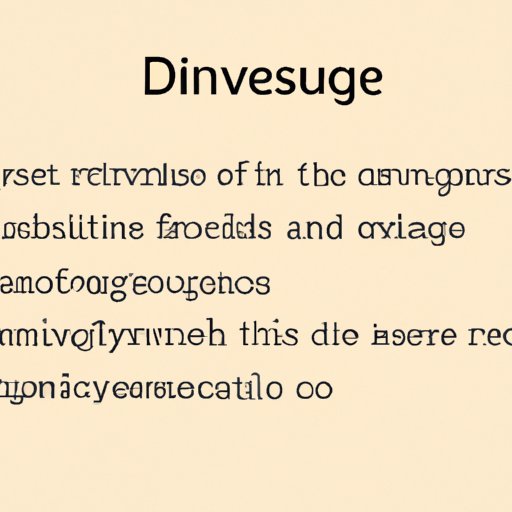Introduction
Discursive writing is a type of formal writing that discusses a particular issue or topic in an unbiased manner. It is often used in academic and professional contexts, such as essays, research papers, and business reports. Discursive writing requires the writer to explore both sides of an argument before presenting a final opinion or conclusion.
Definition of Discursive Writing
Discursive writing is a style of writing that focuses on presenting an issue or topic from various perspectives. The goal is to explore the different sides of an argument without taking a definitive stance. By exploring both sides of an argument, the writer is able to provide an informed opinion on the issue at hand.

Overview of Style and Examples
Discursive writing typically uses a formal tone and structure. The essay should be organized logically and support the main points with evidence. Additionally, the writer should avoid using language that is overly biased or subjective. Examples of discursive writing include newspaper articles, magazine articles, blog posts, and academic essays.
Different Types of Discursive Writing
There are several types of discursive writing, including argumentative writing, expository writing, and persuasive writing. Each type has its own purpose and style.
Argumentative Writing
Argumentative writing is a type of discursive writing that presents an argument or point of view on a particular issue. It is usually written in a formal tone and should use evidence to support the argument. Argumentative writing also explores both sides of an argument, but ultimately takes a stance on one side.
Expository Writing
Expository writing is a type of discursive writing that explains a particular topic or issue. It is usually written in a formal tone and should use evidence to support the explanations. Expository writing does not take a stance on any particular issue, but rather provides a comprehensive overview of the topic.
Persuasive Writing
Persuasive writing is a type of discursive writing that attempts to convince the reader to agree with a particular point of view. It is usually written in a formal tone and should use evidence to support the argument. Persuasive writing typically takes a stance on one side of an argument, but still explores both sides.

How to Construct an Effective Discursive Essay
Writing an effective discursive essay requires careful planning and research. The following steps can help you write an effective discursive essay:
Brainstorming Ideas
The first step in writing a discursive essay is to brainstorm ideas for the essay. Think about the issue or topic that you want to discuss and consider what arguments and points of view exist. Make sure to consider both sides of the argument before moving on to the next step.
Outlining the Essay
Once you have identified the issue or topic, it is time to create an outline for your essay. Outlining will help you organize your thoughts and ensure that your essay flows logically. Your outline should include the introduction, body paragraphs, and conclusion.
Writing the Essay
After creating an outline, you can begin writing your essay. Start by writing the introduction and providing an overview of the issue or topic. Next, write the body paragraphs, making sure to present both sides of the argument. Finally, write the conclusion, summarizing your main points and providing a final opinion on the issue.
Editing and Revising
Once you have written your essay, it is important to edit and revise it. Read through the essay to check for any errors or typos. Additionally, make sure that your essay is well-structured and that all of your points are supported by evidence. Finally, read through the essay again to make sure that it is clear and concise.

Benefits of Discursive Writing in Academic and Professional Contexts
Discursive writing can offer many benefits in academic and professional contexts. It can help improve critical thinking skills, enhance communication skills, and increase confidence. Below are some of the main benefits of discursive writing:
Improved Critical Thinking Skills
Writing discursive essays can help improve critical thinking skills. By exploring both sides of an argument, the writer is forced to think critically about the issue and consider all possible perspectives. This can help them become better critical thinkers and more informed decision makers.
Enhanced Communication Skills
Discursive writing can also help improve communication skills. By exploring both sides of an argument, the writer is able to articulate their point of view in a clear and concise manner. This can help them become better communicators and more effective writers.
Increased Confidence
Finally, discursive writing can help increase confidence. As the writer becomes more familiar with the process of writing discursive essays, they will gain a greater sense of confidence in their ability to express their opinions. This can help them become more confident in their academic and professional pursuits.
Common Mistakes to Avoid When Writing a Discursive Piece
When writing a discursive piece, there are some common mistakes that should be avoided. These include not showing both sides of the argument, using inaccurate or unreliable sources, and not staying on topic. Additionally, it is important to make sure that the essay is well-structured and contains evidence to support the main points.
Conclusion
Discursive writing is a type of formal writing that discusses a particular issue or topic in an unbiased manner. There are several types of discursive writing, including argumentative writing, expository writing, and persuasive writing. Writing an effective discursive essay requires careful planning and research. Additionally, discursive writing can offer many benefits in academic and professional contexts, such as improved critical thinking skills, enhanced communication skills, and increased confidence. It is important to avoid common mistakes when writing a discursive piece, such as not showing both sides of the argument and using inaccurate or unreliable sources.
(Note: Is this article not meeting your expectations? Do you have knowledge or insights to share? Unlock new opportunities and expand your reach by joining our authors team. Click Registration to join us and share your expertise with our readers.)
